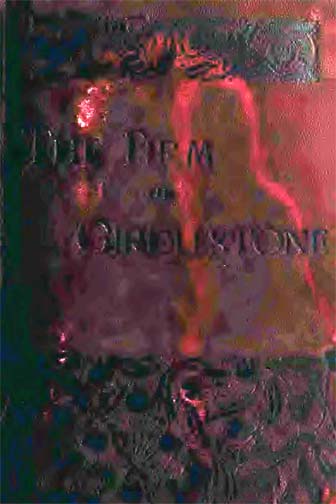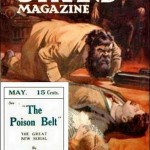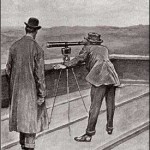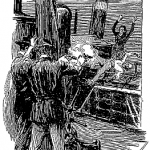
The ruffian Burt was so horror-stricken at the sight of the girl whom he imagined that he had murdered, that he lay grovelling on the railway lines by the side of his victim, moaning with terror, and incapable of any resistance. He was promptly seized by the major’s party, and the Nihilist secured his hands with a handkerchief so quickly and effectively that it was clearly not the first time that he had performed the feat. He then calmly drew a very long and bright knife from the recesses of his frock-coat, and having pressed it against Burt’s nose to ensure his attention, he brandished it in front of him in a menacing way, as a hint that an attempt at escape might be dangerous.
“And who is dis?” asked Baumser, lifting up the dead woman’s head, and resting it upon his knee.
“Poor girl! She will niver spake again, whoever she may have been,” the major said, holding the lantern to her cold pale face. “Here’s where the cowards struck her. Death must have been instantaneous and painless. I could have sworn it was the young lady we came afther, if it were not that we have her safe down there, thank the Lord!”
“Vere are those oders?” asked Von Baumser, peering about through the darkness. “If dere is justice in de country, dey vill hang for the work of dis night.”
“They are off,” the major answered, laying the girl’s head reverently down again. “It’s hopeless to follow them, as we know nothing of the counthry, nor which direction they took. They ran like madmen. Hullo! What the divil can this be?”
The sight which had attracted the veteran’s attention was nothing less than the appearance at the end of the lane of three brilliant luminous discs moving along abreast of one another. They came rapidly nearer, increasing in brilliancy as they approached. Then a voice rang out of the darkness, “There they are, officers! Close with them! Don’t let ’em get away!” And before the major and his party could quite grasp the situation they were valiantly charged by three of those much-enduring, stout-hearted mortals known as the British police force.
It takes courage to plunge into the boiling surf and to carry the rope to the breaking vessel. It takes courage to spring from the ship’s side and support the struggling swimmer, never knowing the moment at which a flickering shadow may appear in the deep green water, and the tiger of the deep turn its white belly upwards as it dashes on its prey. There is courage too in the infantryman who takes a sturdy grip of his rifle and plants his feet firmly as he sees the Lancers sweeping down on his comrades and himself. But of all these types of bravery there is none that can compare with that of our homely constable when he finds on the dark November nights that a door on his beat is ajar, and, listening below, learns that the time has come to show the manhood that is in him. He must fight odds in the dark. He must, single-handed, cage up desperate men like rats in a hole. He must oppose his simple weapon to the six-shooter and the life-preserver. All these thoughts, and the remembrance of his wife and children at home, and of how easy it would be not to observe the open door, come upon him, and then what does he do? Why, with the thought of duty in his heart, and his little cudgel in his hand, he goes to what is too often his death, like a valiant high-minded Englishman, who fears the reproach of his own conscience more than pistol bullet, or bludgeon stroke.
Which digression may serve to emphasize the fact that these three burly Hampshire policemen, having been placed upon our friends’ track by the ostler of the Flying Bull, and having themselves observed manoeuvres which could only be characterized as suspicious, charged down with such vehemence, that in less time than it takes to tell it, both Tom and the major and Von Baumser were in safe custody. The Nihilist, who had an unextinguishable hatred of the law, and who could never be brought to understand that it might under any circumstances be on his side, pulled himself very straight and held his knife down at his hip as though he meant to use it, while Bulow, of Kiel, likewise assumed an aggressive attitude. Fortunately, however, the appearance of their prisoners and a few hurried words from the major made the inspector in charge understand how the land lay, and he transferred his attention to Burt, on whose wrists he placed the handcuffs. He then listened to a more detailed account of the circumstances from the lips of the major.
“Who is this young lady?” he asked, pointing to Kate.
“This is the Miss Harston whom we came to rescue, and for whom no doubt the blow was intended which killed this unhappy girl.”
“Perhaps, sir,” said the inspector to Tom, “you had better take her up to the house.”




